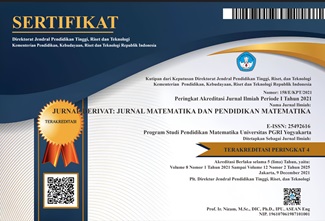Pengembangan Media Pembelajaran Interaktif Berbasis Lms Moodle Ditinjau Dari Cognitive Loads Theory
DOI:
https://doi.org/10.31316/j.derivat.v6i2.498Abstract
Abstract
The development of E-Learning is based on the development of IPTEK as a resource for the fulfillment of core competencies in curriculum 2013 which facilitate students and teachers in the learning process. The research uses R&D design, based from cognitive loads theory with the Borg & Gall development model. The steps are: research and information collection, research planning, initial product development, preliminary field test involving 4 students, revision of preliminary field test result, wider field test involving 8 students, test revision A field, a feasibility test involving 32 students, and a revision of the feasibility of a trial subject in research is a grade VIII student of SMP Negeri 1 Mlati, Kab. Sleman, D.I. Yogyakarta. Data is collected through polls and observations during trials, and then research results are analyzed with quantitative descriptive analysis techniques. Media expert responses get an average score of 3.91. While the responses of the material experts acquired an average score of 3.60 showed a Moodle-based e-learning is decent in terms of media and worthy of material terms. The results of the study on field implementation test show that all students of class VIII C percentage of class submission are above 86%. The results of the students ' responses to small and large scale trials showed that the majority of students gave positive feedback on learning activities using LMS Moodle-based e-learning media. LMS Moodle's final e-learning product contains material, video links, ppt links, quizzes, articles around mathematical numeral patterns, chat and discussion forums. Thus, from the test results of the implementation of the field can be concluded that E-learning based on LMS Moodle Mathematics learning for students of grade VIII C SMP Negeri 1 Mlati, with material "number pattern" is feasible as one of the sources Study both individually and in groups.
Â
Keywords: Development of E-learning, LMS Moodle, Cognitive Loads Theory
Mathematics, Numbers PatternDownloads
Published
Issue
Section
Citation Check
License
Authors who publish with this journal agree to the following terms:
-
Authors retain copyright and grant the journal right of first publication with the work simultaneously licensed under a Creative Commons Attribution-ShareAlike 4.0 International License that allows others to share the work with an acknowledgment of the work's authorship and initial publication in this journal.
- Authors are able to enter into separate, additional contractual arrangements for the non-exclusive distribution of the journal's published version of the work (e.g., post it to an institutional repository or publish it in a book), with an acknowledgment of its initial publication in this journal.
- Authors are permitted and encouraged to post their work online (e.g., in institutional repositories or on their website) prior to and during the submission process, as it can lead to productive exchanges, as well as earlier and greater citation of published work (See The Effect of Open Access).







